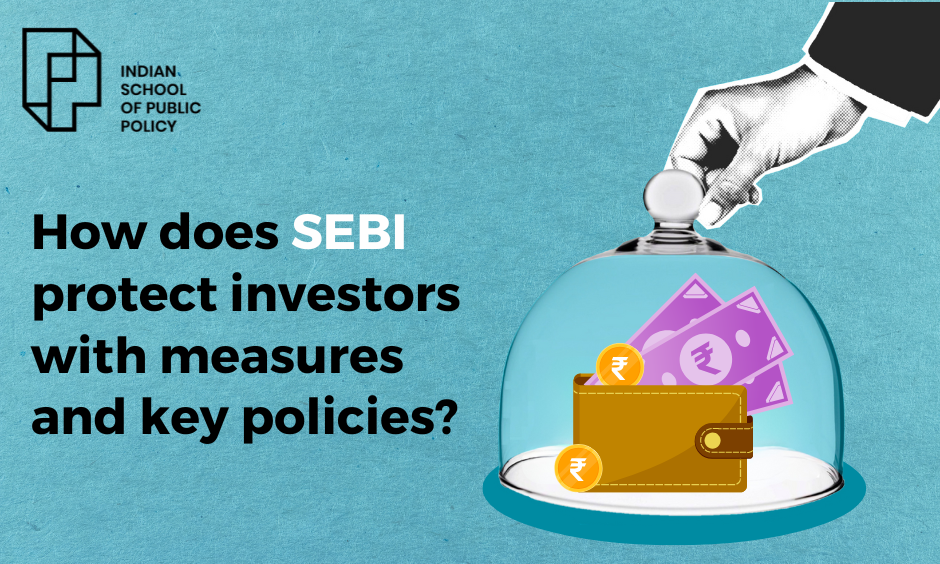
How do SEBI’s policies and regulations protect investors?

How does SEBI safeguard investors with its measures?
The primary and secondary financial markets thrive on the active participation of investors. These individuals and organisations invest in the stock market, contributing to economic growth and market expansion, while seeking profitable returns. Protecting investors ensures they are well-informed about their transactions, purchases, and corporate activities, fostering trust and active engagement.
The Securities and Exchange Board of India (SEBI) was established to safeguard the interests of securities investors while promoting the development and regulation of the stock market. Let’s understand how SEBI’s investor protection measures ensure fairness and transparency in the financial markets.
But first things first!
Before diving into SEBI’s specific measures, let’s first understand who investors are and why their protection is critical.
Who are market financial investors and why are their protections vital?
An investor is an individual or a legal entity that contributes funds to a project, company, or financial asset with the intention of earning a return. Their participation fuels the growth of the financial market, making them a cornerstone of economic progress, thereby making investor protection important. Why? The protection of investors from malpractice or broker failures is vital to the securities market, especially while opening trading accounts. It is their confidence that drives financial system stability and growth.
Example: The SEBI Act, of 1992, defines investor protection as safeguarding the interests of investors while promoting and regulating the securities market, fostering a secure and transparent environment.
How do SEBI’s policies and regulations protect investors?
The Securities and Exchange Board of India (SEBI) was officially established on 12 April 1992 as the statutory regulatory body to oversee the stock exchanges in India.
The main objective of SEBI is to regulate and manage these markets by developing policies to ensure transparency, responsibility and justice. The main mission of SEBI is to protect the interests of investors in the stock market. Responsible for:
- Supervise and promote the stock market to be stable and efficient.
- Regulation of stock brokers small traders Portfolio Manager financial analyst Merchant financier and other market participants
- Follow the activities of the Custodian, a credit rating agency. and foreign portfolio investors
- Preventing fraud and unfair business practices
- Prevention of insider trading and other manipulations
- Ensure that investors are informed about intermediaries and market activities.
- Track key corporate acquisitions and acquisitions.
SEBI has implemented several rules and policies to ensure that market participants including listed companies, brokers, stock exchanges and investment advisor adhere to standards of transparency and professionalism. These rules address important issues such as insider trading, disclosure requirements and market manipulation.
To strengthen the safety of the investors, SEBI has brought some measures. The main actions are ensuring companies to publish financial performance, corporate governance policies and other relevant information.
What are the investor protection measures of SEBI?
To ensure the continuous protection of investors, SEBI has implemented various procedures and initiatives. These include issuing several directives, conducting extensive investor awareness campaigns, and establishing the Investor Protection Fund (IPF), which offers financial compensation to investors under specific circumstances. SEBI’s efforts are designed to safeguard the interests of market participants and create a secure investment environment.
As per Section 11(2) of the SEBI Act, 1992, SEBI is empowered with specific provisions to fulfil its mandate of protecting investors. These provisions include:
1. Preventing unfair trade practices
SEBI ensures that market participants adhere to fair trading practices, preventing activities like insider trading and market manipulation.
2. Regulating takeovers and acquisitions
By overseeing significant share acquisitions and corporate takeovers, SEBI ensures that such activities are conducted transparently and equitably.
3. Promoting investor education
SEBI conducts investor awareness campaigns to educate individuals about their rights and responsibilities in the securities market. This helps investors make informed decisions.
4. Monitoring stock exchanges
SEBI governs the operations of stock exchanges, ensuring that they function efficiently and adhere to regulatory standards.
5. Establishing the Investor Protection Fund (IPF)
SEBI’s IPF compensates investors in case of defaults by brokers, providing an additional layer of security.
6. Regulating intermediaries
SEBI registers and oversees brokers, mutual funds, and portfolio managers to ensure they operate professionally and ethically.
7. Enhancing disclosure requirements
SEBI mandates timely and comprehensive disclosures by companies regarding their financial performance, corporate governance, and material developments, empowering investors with crucial information.
What are the challenges SEBI faces in protecting investors?
Despite its comprehensive framework, SEBI faces several challenges in ensuring investor protection:
1. Developing balanced regulations
SEBI must align the interests of investors, issuers, and intermediaries while fostering market growth. Striking this balance is a complex task.
2. Coordination with other regulators
Ensuring seamless cooperation with entities like the Reserve Bank of India (RBI) and the Ministry of Corporate Affairs is essential for a unified regulatory approach.
3. Evolving market dynamics
Rapid changes in technology and market practices require SEBI to continually adapt its policies to address emerging risks effectively. Policymakers play a crucial role in designing and implementing effective solutions to address these challenges. Their expertise in governance, regulatory frameworks, and market dynamics can drive impactful interventions.
Here’s how skilled policymakers can help:
1. Developing balanced regulations
Policymakers can craft nuanced regulations that strike a balance between investor protection and market development. By consulting stakeholders and analysing market trends, they can create policies that safeguard investors without hampering innovation or growth.
2. Strengthening inter-regulatory coordination
To address the issue of fragmented regulations, policymakers can establish better communication and collaboration channels between SEBI and other regulatory bodies. Initiatives like shared databases, joint task forces, and unified regulatory frameworks can ensure seamless governance.
3. Integrating technology into regulation
Policymakers can drive the adoption of regulatory technologies (RegTech) to monitor and manage market activities more effectively. By incorporating artificial intelligence, blockchain, and data analytics into regulatory processes, SEBI can detect fraud and misconduct faster.
4. Enhancing enforcement mechanisms
By strengthening investigative processes and legal frameworks, policymakers can make enforcement actions more decisive and deterrent. This includes empowering SEBI with greater autonomy and resources to combat fraud effectively.
5. Expanding financial literacy initiatives
Policymakers can design inclusive investor education programmes that target underserved regions and demographics. Leveraging digital platforms, local languages, and partnerships with educational institutions can significantly enhance outreach and awareness.
The need for skilled policymakers to save the day!
As markets evolve and become increasingly complex, the role of skilled policymakers becomes even more critical. Policymakers with a deep understanding of market dynamics, investor psychology, and technological advancements are essential to ensure SEBI remains agile and effective. They can foresee emerging challenges and craft forward-looking policies that not only address existing issues but also pre-empt future risks.
Programmes like the Post Graduate programme in Public Policy, Design & Management play a vital role in equipping future policymakers with the skills and knowledge needed to navigate these complexities.
By investing in education and capacity building, India can ensure a steady pipeline of competent policymakers who can safeguard investor interests and drive sustainable market growth.
Conclusion
SEBI plays an indispensable role in safeguarding investors through its robust regulatory framework and investor-focused policies. By promoting transparency, accountability, and fairness, SEBI has created a secure environment for market participants. However, the challenges it faces underline the importance of continuous innovation and collaboration in regulatory practices. For aspiring policymakers, SEBI’s approach serves as an exemplary model of balancing growth with investor protection.
Register your Interest to Study at ISPP
FAQS
What is SEBI’s primary role in the securities market?
SEBI regulates and develops India’s securities market while ensuring investor protection.
How does SEBI safeguard investors?
SEBI implements policies to prevent fraud, enhance disclosures, and monitor intermediaries, ensuring a fair market environment.
What is the Investor Protection Fund (IPF)?
SEBI’s IPF provides compensation to investors in case of defaults by brokers, adding an extra layer of financial security.
Why is investor protection important?
Investor protection fosters trust, ensuring active participation in the market and contributing to economic growth.
What challenges does SEBI face in investor protection?
SEBI must balance diverse stakeholder interests, coordinate with other regulators, and adapt to evolving market dynamics.


